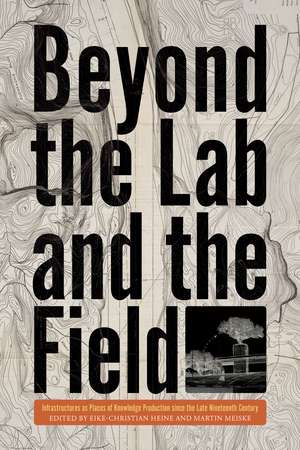Beyond the Lab and the Field: Infrastructures as Places of Knowledge Production Since the Late Nineteenth Century: INTERSECTIONS: Histories of Environment
Editat de Eike-Christian Heine, Martin Meiskeen Limba Engleză Hardback – 19 apr 2022
This volume explores how innovative technologies provided research opportunities for scientists and engineers, as they relied on expertise to operate, which resulted in enormous profits for some. But, like the history of any gold rush, the history of infrastructure also reveals how technologies of modernity transformed nature, disrupting communities and destroying the local environment. Focusing not on the victory march of science and technology but on ambivalent change, contributors consider the role of infrastructures for ecology, geology, archaeology, soil science, engineering, ethnography, heritage, and polar exploration. Together, they also examine largely overlooked perspectives on modernity: the reliance of infrastructure on knowledge, and infrastructures as places and occasions that inspired a greater understanding of the natural world and the technologically made environment.
Din seria INTERSECTIONS: Histories of Environment
-
 Preț: 436.80 lei
Preț: 436.80 lei -
 Preț: 200.41 lei
Preț: 200.41 lei -
 Preț: 400.33 lei
Preț: 400.33 lei -
 Preț: 430.27 lei
Preț: 430.27 lei -
 Preț: 359.45 lei
Preț: 359.45 lei -
 Preț: 492.26 lei
Preț: 492.26 lei -
 Preț: 427.77 lei
Preț: 427.77 lei -
 Preț: 500.91 lei
Preț: 500.91 lei -
 Preț: 333.77 lei
Preț: 333.77 lei - 15%
 Preț: 457.24 lei
Preț: 457.24 lei -
 Preț: 461.72 lei
Preț: 461.72 lei -
 Preț: 320.52 lei
Preț: 320.52 lei -
 Preț: 350.79 lei
Preț: 350.79 lei -
 Preț: 387.44 lei
Preț: 387.44 lei
Preț: 459.98 lei
Nou
Puncte Express: 690
Preț estimativ în valută:
88.01€ • 92.14$ • 72.83£
88.01€ • 92.14$ • 72.83£
Carte disponibilă
Livrare economică 17-31 martie
Preluare comenzi: 021 569.72.76
Specificații
ISBN-13: 9780822946373
ISBN-10: 0822946378
Pagini: 304
Dimensiuni: 152 x 229 x 36 mm
Greutate: 0.54 kg
Ediția:1
Editura: University of Pittsburgh Press
Colecția University of Pittsburgh Press
Seria INTERSECTIONS: Histories of Environment
ISBN-10: 0822946378
Pagini: 304
Dimensiuni: 152 x 229 x 36 mm
Greutate: 0.54 kg
Ediția:1
Editura: University of Pittsburgh Press
Colecția University of Pittsburgh Press
Seria INTERSECTIONS: Histories of Environment
Recenzii
“This fascinating volume shows that dams, highways, and canals are much more than large technical systems. Ten exciting case studies from around the world reveal unexpected connections between infrastructure, science, and the environment. Going beyond traditional studies of engineering history, the authors illustrate how all kinds of scientists eagerly grabbed the opportunities that technical projects offered.” —Mikael Hård, Technical University of Darmstadt, Germany
“Historians of science usually consider laboratories, the field, or researchers’ desks as places of knowledge production. Contributors to this insightful volume open our eyes and show how the construction of large-scale infrastructures also presented opportunities for research and data collection, enriching many disciplines—including geology, ethnography, and polar exploration—but not without disrupting communities or destroying local environments. They provide a fantastic panorama of well-written new stories that enrich our views on the relationship between infrastructure and knowledge since the late nineteenth century.” —Matthias Heymann, Aarhus University
"By advancing our understanding of the complex relationship between infrastructure and knowledge, this volume deserves a place in the intellectual toolbox of historians of science, technology, and the environment. Kudos to the press, editors, and authors for producing a cohesive collection of thought-provoking essays"
--Christine Keiner, Rochester Institute of Technology, H-Sci-Med-Tech
“Historians of science usually consider laboratories, the field, or researchers’ desks as places of knowledge production. Contributors to this insightful volume open our eyes and show how the construction of large-scale infrastructures also presented opportunities for research and data collection, enriching many disciplines—including geology, ethnography, and polar exploration—but not without disrupting communities or destroying local environments. They provide a fantastic panorama of well-written new stories that enrich our views on the relationship between infrastructure and knowledge since the late nineteenth century.” —Matthias Heymann, Aarhus University
"By advancing our understanding of the complex relationship between infrastructure and knowledge, this volume deserves a place in the intellectual toolbox of historians of science, technology, and the environment. Kudos to the press, editors, and authors for producing a cohesive collection of thought-provoking essays"
--Christine Keiner, Rochester Institute of Technology, H-Sci-Med-Tech
Notă biografică
Eike-Christian Heine is a postdoctoral fellow at the Department for the History of Science and Technology at the Historical Institute of the Technical University Braunschweig in Germany.
Martin Meiske is a postdoctoral fellow at the Research Institute for the History of Science and Technology at the Deutsches Museum, Munich.
Martin Meiske is a postdoctoral fellow at the Research Institute for the History of Science and Technology at the Deutsches Museum, Munich.
